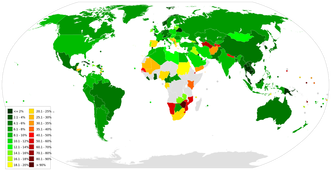> The proportion of the population whose income is less than $1 must be halved
> Full and productive employment and decent work must be achieved by all
The past years have caused an economic and labor market crisis which plagued the world since 2008. The labor market slowdown is dramatic with a current deficit of around 50 million jobs in comparison to the pre-crisis situation (ILO 2012). The crisis has paralyzed enterprises and forced millions of people into unemployment. Since the economic crisis, more workers have been finding themselves and their families living in extreme poverty, partly due to the vulnerable employment relationships or even unemployment. In addition, the lack of opportunities for decent work disproportionately affects youth and women.
The International Year of Youth (2010/2011) comes at a time when global youth unemployment rate is at an all-time high. According to a recent report published by the International Labor Organization (ILO), of the 620 million economically active youth between the ages of 15 and 24, 81 million were out of work at the end of 2009. There was a noticeable increase of over 2% from the 2007 figures of 11.9%, therefore making this the highest rate ever. With economies worldwide still recovering from the recent 3 year economic slump, the ILO predicts there will be huge numbers of unemployed youths adding to this number (ILO 2010).
Developing countries account for almost 90% of the world’s youths. The ramifications of high numbers of youth unemployment are much worse than in developed countries, with a serious threat of social disruption. Individually, figures of youth population may more than double by 2050 according to Carl Haub, senior demographer at the Population Reference Bureau (PRB). “Young people are the drivers of economic development […] Forgoing this potential is an economic waste and can undermine social stability” stressed Mr. Juan Somavia, ILO’s General Director. Far from being the drivers of economic development, nevertheless, in the case of development processes for most developing nations, these youths are undoubtedly the building blocks of the future.
Youth unemployment rates do not have to end in a catastrophe for those generations labeled the Millenials (Generation Y: 1982-1990) and the Internet Generation (Generation Z: 1991 – present) and those it sustains. They might actually benefit from the situation if policymakers can incentivize and support them to follow their dreams. There are already significant numbers of young people who would rather start their own business instead of working for someone else. However, governments around the world are not yet ready to regulate and sustain this trend in the labor market.

Entrepreneurship is an important driver of economic prosperity and social well-being, creating jobs and economic competitiveness (Monitor Company Group 2009). In 2003, SMEs accounted for roughly 66% of employment within the EU (34% from micro enterprises with less than 10 employees) (Eurostat 2010). Evidence suggests that the entrepreneurial intentions and founding rates among the unemployed are high and the survival rates of their firms impressive. For instance, formerly unemployed founders are responsible for 62% of new firms created in Germany, 30 % in Sweden, and 15 % in Austria (SCB 1994; Institut für Mittelstandsforschung 2005). Firms created by the unemployed even seem to have slightly higher survival chances than other types of new firms (Brüderl, Preisendörfer and Ziegler 1992).
While many countries have initiated programs to tackle the above-mentioned problems on the labor market, few countries have true control of the situation. Entrepreneurship programs are on the uprise and governments as well as schools and universities see an increasing importance of entrepreneurship in helping establish and maintain tomorrow’s jobs. One approach that has proven to be successful in Western countries is policy programs to help transition unemployed individuals into self-employment. Various countries have set up similar policy solutions with comparable features such as financial assistance in the form of a government stipend equivalent to the unemployment, tax incentives, coaching and training (Benus, Johnson, Wood et al. 1994; OECD 1995; Blanchflower and Street 2004)
While entrepreneurs are the ones that implement change, they alone cannot be held responsible for creating the next steps in societal evolution and the development of tomorrow’s jobs. There are many varied factors that influence entrepreneurship, ranging from economic and political to socio-cultural ones. Therefore, when discussing entrepreneurs as the agents of change, it is at least as important to discuss the environment in which they want to, or have to, create these changes. What changes have to take place on a political level to foster entrepreneurship and promote entrepreneurially-minded people in their endeavors?


 RSS Feed
RSS Feed
